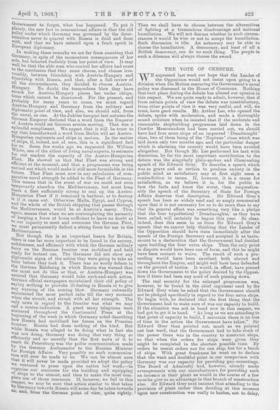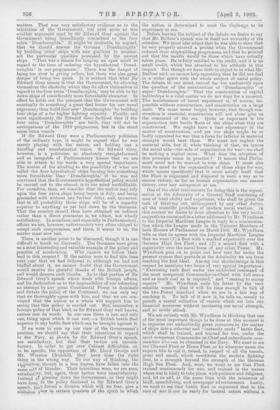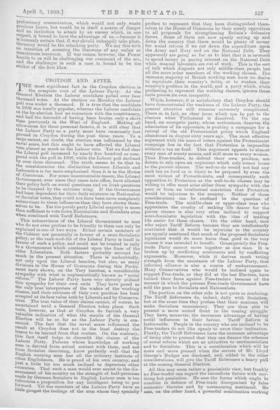THE VOTE OF CENSURE.
WE expressed last week our hope that the Leader of the Opposition would not insist upon going to a division when the Motion censuring the Government's naval policy was discussed in the House of Commons. Nothing that took place during the debate has altered our opinion in this respect. We are quite ready to admit, however, that if from certain points of view the debate was unsatisfactory, from other points of view it was very useful, and will, we trust, have good results. Mr. Arthur Lee, who opened the debate, spoke with moderation, and made a thoroughly sound criticism when he insisted that if the moderate and reasonable shipbuilding programme laid down in the Cawdor Memorandum had been carried out, we should have had four more ships of an improved ' Dreadnought class, two of them being of the Neptune' class which was laid down only two mouths ago, and the particular danger which is alarming the country would have been avoided altogether. But though Mr. Lee performed his task with discretion, by far the most important contribution to the debate was the singularly plain-spoken and illuminating speech of Sir Edward Grey. To describe a speech which was so grave and so certain to produce anxiety in the public mind as satisfactory may at first sight seem a contradiction in terms. If, however, it is a cause for satisfaction, as we believe it is, for the public to face the facts and know the worst, then unquestion- ably the speech of the Secretary of State for Foreign Affairs deserves that description. Sir Edward Grey's speech has been so widely read and so amply commented upon that it is not necessary for us to do more than to say that its general effect was something very like a pledge that the four hypothetical Dreaduoughts,' as they have been called, will certainly be begun this year. So clear, indeed, does this seem to us from Sir Edward Grey's speech that we cannot help thinking that the Leader of the Opposition should have risen immediately after the speech of the Foreign Secretary and accepted it as tanta- mount to a declaration that the Government had decided upon building the four extra ships. Then the only point in dispute would have been one of form, and this he might have been content to waive. The result of such a pro- ceeding would have been excellent both abroad and throughout the Empire, and might well have been defended on the ground of tactics. It would, in effect, have pinned down the Government to the policy desired by the Opposi- tion if there had been any need of such pinning down.
The real security for the enlarged programme was, however, to be found in the chief argument used by Sir Edward Grey when lie asked that the ,Government should not be pledged specifically in regard to the four extra ships. To begin with, he declared that the first thing that the Government had to make sure of was our capacity to build. If the situation was not in hand now in this respect, we had got to get it in hand. "As long as we are attending to that point of capacity to build, I maintain there is no loss of time in the action the Government have taken." Sir Edward Grey then pointed out, much as we pointed out last week, that the Government had to take stock of the power there was in the country to construct ships, so that when the orders for ships were given they might be completed in the shortest possible time. By orders he meant orders not for one ship, but for a batch of ships. With great frankness he went on to declare that the weak and doubtful point in our comparison with Germany was our capacity for providing gun-mountings. The Board of Admiralty had, however, already made arrangements with our manufacturers for providing such an increme in their plant as would in the course of a few i months give us an advantage n that branch of construction also. Sir Edward Grey next insisted that attending to the provision of plant rather than deciding at this moment upon new construction was really to hasten, not to delay, matters. That was very satisfactory evidence As to the intentions of the Government, but even more so was another argument used. by Sir Edward Grey against the Government being immediately committed. to the four extra ' ])readnoughts.' It might be desirable, he argued, that we should answer the German Dreadnoughts ' by building ' other ships with new qualities to counter- act the particular qualities possessed by the newest ships. "That was a reason for keeping an open mind. in regard to the time of ordering the hypothetical 'Dread- noughts' in our programme." There was the danger of being too slow in giving orders, but there was also great danger of being too quick. It is evident that what Sir Edward Grey means is that the Government, by allowing themselves the elasticity which they do allow themselves in regard to the four extra 'Dreadnoughts,' may be able to lay down ships Of considerably more formidable character. In effect he holds out the prospect that the Government will eventually do something a great deal better for our naval supremacy than build four new Dreadnoughts' by building four ships of a far higher fighting capacity. Finally, and reost significantly, Sir Edward Grey declared that if the four extra Dreadnoughts ' are built, they will not be anticipations of the 1910 programme, but in the strict sense extra vessels.
If Sir Edward Grey were a Parliamentary politician of the ordinary type, it might be argued that he was merely playing with the nation, and holding• out a dazzling and unsubstantial vision. Sir Edward Grey, however, is a politician so absolutely straightforward and so incapable of Parliamentary finesse that we are able to attach to his words a very special importance. The notion of his alluding to the possibility of what are called the four hypothetical ships turning into something more formidable than Dreaduoug,hts,' if he was not convinced that the Government's hypothetical policy.would be carried out to the utmost, is to our mind unthinkable. For ourselves, then, we consider that the nation may rely upon the four extra ships being begun in July, and being proceeded with without any further delay, and, moreover, that in all probability those ships will be of a capacity superior to anything as yet laid down by the Germans. That the country should thus have obtained an indirect rather than a direct guarantee is, we admit, not wholly satisfactory. In mundane, and especially in Parliamentary, affairs we are, hoWever, unfortunately very often obliged to accept such compromises, and there, it seems to us, the matter must now rest.
There is another point to be discussed; though it is one difficult to touch on discreetly. The Germans have given us a most interesting and valuable example of the policy and practice of acceleration. Why cannot we follow their lead in this, respect ? If the nation were to find this time next year that we had followed .it, although wo had not bluffed about it, we cannot doubt that the Government would receive the grateful thanks of the British people, and would deserve such thanks. As to that portion of Sir Edward Grey's speech which dealt with foreign affairs, and his declaration as to the impossibility of our tolerating an attempt by any great Continental Power to dominate and dictate the policy of the Continent, we can only say that we thoroughly agree with him, and that we are con- vinced that the nation as a whole will support him in seeing that this policy is carried out. But, remember, a foreign policy of that kind, as Sir Edward Grey well knows, cannot rest on words. In our case there is one, and only one, thing upon which it can rest,—a British battle fleet superior to any battle fleet which can be brought against it.
If we were to sum up our view of the Government's position, we should say that their intentions in regard to the Navy, as shown by Sir Edward Grey's speech, are satisfactory, but that their tactics are unsatis- factory. In order to got over Cabinet difficulties, or, to be specific, the opposition of Mr. Lloyd George and Mr. Winston Churchill, they have done the right thing in the wrong way. To our way of thinking, the opIpaition, though in a less degree, have fallen into the same so\yt of blunder. Their intentions were, we are sure, satisfacOrY, but, again, their tactics were unsatisfactory. Instead e`f pinning down the Government, as they might haVe done, t9 the policy disclosed in Sir Edward Grey's speech, their forced a division which will, we fear, give a mietakeu v?ieW i4 certain quarters of the spirit in which the nation is determined to meet the challeage to its supremacy at sea.
Before leaving the subject of the debate we desire to say that Mr.Balfour's speech was in itself not unworthy of the occasion. We must also admit that he was able to show that he very properly entered a protest when the Government reduced their shipbuilding programme, and that he pointed out that the results would be those which have actually taken place. He is fully entitled to time credit, and it is no small credit, which has attached to his attitude in this respect. But though we have little to object to in what Mr. Balfour said, we cannot help regretting that he did not deal in a wider spirit with the wale subject of naval policy. The debate, to our mind, turned far too exclusively upon the question of the construction of 'Dreadnoughts or super-' Dreadnoughts.' That the construction of capital battleships is a vital matter we do not deny for a moment. The .maintenance of naval supremacy is, of course, im- possible without construction, and construction on a large scale. We must never forget, however, that though con- struction is essential, construction will not alone give us the command of the sea. Quite as important is the organisation into battle fleets of the ships when they are constructed. We might have a vast supremacy in time matter of construction, and yet our ships might be so badly organised for war that a force far inferior in material strength would beat them. We must not neglect the material side, but if, while thinking of that, we ignore the moral side—the side of organisation for war—we shall be making a capital error. What does the adoption of this principle mean in practice ? It means that Parlia- ment must not be content to vote ships. It must also turn its mind to the organisation of those ships for war, which means specifically that it must satisfy itself that the Fleet is organised and disposed in such a way as to ensure victory, as far as human organisation can ensure victory, over any antag,ouist at sea.
One of the chief instruments for doing this is the organi- sation at the Admiralty of a General Staff consisting of men of tried ability and experience, who shall be given the task of thinking out, unhampered by any other duties, all the scientific problems of modern naval warfare. In this context we desire to draw attention to the very useful suggestions contained in a letter addressed by Mr. Wyndham to the Imperial Maritime League in reply to a communica- tion which the League made to the Unionist Members of both Houses of Parliament on March 15th. Mr. Wyndham tells us that he agrees with the Imperial Maritime League that we want (1) a fleet with a marked superiority over the German High Sea Fleet ; and. (2) a second fleet with a superiority over the naval force of any other Power. Mr. Wyndham goes on to point out how very far under the present system that prevails at the Admiralty we are from reaching the first ideal. Among our shortcomings in this respect Ile mentions two items of very special importance : "Exercising such fleet under the undivided, command of the most competent Commander-in-Chief with full crows and as much coal as is required," and "ceasing to scamp repairs." Mr. Wyndham ends his letter by the very sensible remark that it will be time enough to talk Of the two-Power • standard when we are in a. fair way of reaching it. To talk of it now is, he tells us, merely to parade a casual collection of vessels which eat into our financial resources without increasing our naval strength, and so invite attack.
We are entirely with Mr. Wyndham in thinking that one of the most important things to be done at this moment is to organise our uudoubtedly great resources in time matter of ships into a coherent and "instantly ready" battle fleet, which shall be trained, and trained for war, under the most competent Commander-in-Chief and subordinate com- manders who can be obtained in the Navy. We want to see our Channel Fleet or Home Fleet, or by whatever name the experts like to call it, raised, in respect of all the vessels, great and small, which constitute the modern fighting fleet, to a strength beyond the strength of the German High Sea Fleet. And, next, we want to see that Fleet trained continuously for war, and trained in time waters where war is likely to take place, with patience and diligence, and, let us add, at the same time with the minimum of bluff, speechifying, and newspaper advertisement. Lastly, we want to see that battle fleet so organised that in the case of war it can be ready for instant action without .a Preliminary concentration, which would not only waste Precious hours, but would be in itself a source of danger and an invitation to attack by an enemy which, in one respect, is bound to have the advantage of us,—because it la humanly certain that, if war should unhappily take place, gertnany would be the attacking party. We say this with no intention of accusing the Germans of any unfair or treacherous intention. If war comes, however, the Power lOsLile to us will be challenging our command, of the sea, and the challenger in such a case is bound to be the striker of the first blow.












































 Previous page
Previous page